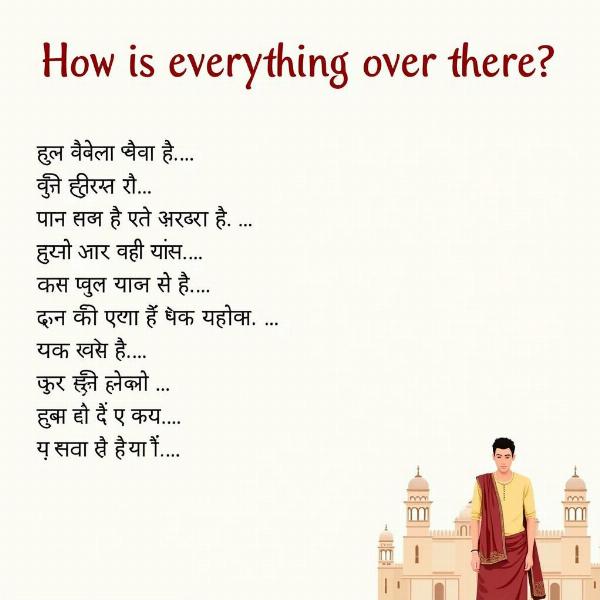Understanding the nuances of greetings and well-being inquiries across languages can be tricky. If you’re looking for the Hindi equivalent of “How is everything over there?”, you’ve come to the right place. This article explores various ways to express this sentiment in Hindi, catering to different levels of formality and regional variations. We’ll delve into the cultural context behind these phrases and offer practical examples to ensure you communicate effectively and respectfully.
Different Ways to Say “How is Everything Over There?” in Hindi
There isn’t one single perfect translation for “How is everything over there?” in Hindi. The best choice depends on the context and your relationship with the person you’re addressing. Here are some common options:
-
वहाँ सब कैसा है? (Wahān sab kaisā hai?): This is a straightforward and widely understood translation. It’s suitable for both formal and informal settings. “Wahān” means “there,” “sab” means “everything,” and “kaisā” means “how.”
-
उधर सब ठीक है? (Udhar sab theek hai?): This phrase translates to “Is everything alright over there?” and is a more casual way of inquiring about the situation. “Udhar” also means “there,” and “theek” means “alright” or “okay.”
-
सब कुशल मंगल है? (Sab kushal mangal hai?): This is a more traditional and formal expression, often used in letters or when addressing elders. It conveys a sense of wishing well-being and prosperity. “Kushal mangal” refers to overall well-being and auspiciousness.
-
क्या हाल है वहाँ? (Kya haal hai wahān?): This phrase literally translates to “What’s the condition there?” but is commonly used to ask about the general situation or well-being of people in a particular place.
Understanding the Cultural Context
Indian culture emphasizes politeness and respect, especially when addressing elders or those in positions of authority. Choosing the right phrase can demonstrate your cultural sensitivity and build stronger relationships. For instance, using “Sab kushal mangal hai?” with an elder shows respect, while “Udhar sab theek hai?” is more appropriate for a friend or colleague.
Responding to “How is Everything Over There?” in Hindi
Just as there are various ways to ask, there are several ways to respond. Here are a few examples:
- सब ठीक है (Sab theek hai): Everything is fine.
- हाँ, सब बढ़िया है (Haan, sab badhiya hai): Yes, everything is great.
- बस, ठीक चल रहा है (Bas, theek chal raha hai): Just going okay.
- कुछ खास नहीं (Kuch khaas nahin): Nothing special.
 Responding to How is Everything Over There in Hindi?
Responding to How is Everything Over There in Hindi?
Example Conversations
Here are some examples of how these phrases might be used in conversation:
Formal:
- Person A: नमस्ते जी, सब कुशल मंगल है आपके घर पर? (Namaste ji, sab kushal mangal hai aapke ghar par?) (Hello, is everything well at your home?)
- Person B: जी, सब कुशल मंगल है, आपकी कृपा है. (Ji, sab kushal mangal hai, aapki kripa hai.) (Yes, everything is well, thanks to your blessings.)
Informal:
- Person A: अरे यार, उधर सब ठीक है? (Are yaar, udhar sab theek hai?) (Hey friend, is everything alright over there?)
- Person B: हाँ यार, सब बढ़िया है. तेरा क्या हाल है? (Haan yaar, sab badhiya hai. Tera kya haal hai?) (Yes, everything’s great. How are you?)
Conclusion
Knowing how to ask “How is everything over there?” in Hindi allows you to connect with others on a deeper level, demonstrating cultural sensitivity and respect. By understanding the nuances of these phrases, you can communicate effectively and build stronger relationships with Hindi speakers. Whether you choose the formal “Sab kushal mangal hai?” or the more casual “Udhar sab theek hai?”, your genuine concern will be appreciated.
FAQ
- What is the most common way to ask “How is everything over there?” in Hindi? Wahān sab kaisā hai? is a common and versatile option.
- Is there a formal way to ask this question? Sab kushal mangal hai? is a more formal and traditional expression.
- How do I respond if someone asks me this question? Sab theek hai (Everything is fine) is a standard response.
- Does the meaning change based on the region in India? While the core meaning remains consistent, regional dialects may have slight variations in pronunciation or word choice.
- Is it important to use the correct phrasing? Using the appropriate level of formality shows respect and cultural awareness.
- Can I use these phrases in written communication? Yes, these phrases are suitable for both spoken and written communication.
- Where can I learn more about Hindi greetings and expressions? Numerous online resources and language learning platforms offer comprehensive lessons on Hindi.
Related Articles:
- oblong meaning in hindi
- new vocabulary words with meaning in hindi
- fus meaning in hindi
- i know very well in hindi meaning
Meaning-Hindi.in is your one-stop solution for all your Hindi translation needs. We offer a wide range of services, including business and commercial document translation, certified and legal document translation, technical and user manual translation, website and localization services, educational and academic document translation, express translation, and specialized translation services. Our team of expert Hindi linguists ensures accurate and culturally sensitive translations to bridge the communication gap between languages and cultures. Contact us today for a seamless translation experience! Email: [email protected], Phone: +91 11-4502-7584. Connect with Meaning-Hindi.in now for all your translation requirements.